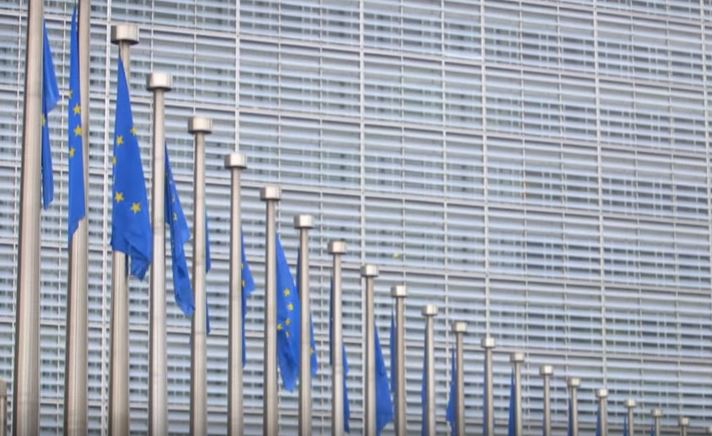
The New York Times: “Regardless of ‘Brexit’ Vote, Experts Say, E.U. Must Rethink Status Quo” By Jim Yardley.
Among the well-heeled bureaucrats of the European Union, it is an article of faith that the bloc always emerges stronger from a crisis. The idealistic founders who six decades ago dreamed of stitching warring nations into a peaceful whole knew the path would be bumpy. But always, the union wobbled forward.
Now the dream of an integrated and ever-stronger Europe could sink into the English Channel on Thursday, when British voters decide whether to abandon the bloc. To the pro-Europe establishment, this latest crisis is considered a peculiarly British affair, in which the villains are opportunistic politicians steering voters toward a delusional, self-inflicted mistake.
That may be. But if Britain does leave, the European Union can also blame its own handling of the crises of the past decade — the tribulations of the euro, the debt standoff with Greece and a flawed approach to migration. Each time, the bloc rammed through ugly, short-term fixes that only inflamed the angry nationalism now spreading across the Continent and Britain.
The result was almost a decade of ad hoc crisis management that even many admirers agree has left the European Union badly wounded and its reputation badly damaged. Idealism has given way to disillusionment. The bloc’s elite technocrats are often perceived as out of touch, while European institutions are not fully equipped to address problems like unemployment and economic stagnation. Political solidarity is dissolving into regional divisions of east and west, north and south.
The economic implications of a British exit, the so-called Brexit, are potentially staggering, but many experts agree that regardless of how the British vote, politics across Europe must change. The structure of the euro currency zone is still considered fragile. The bloc’s German-dominated economic policy has meant nearly a decade lost in much of debt-ridden southern Europe, which is still struggling to recover from its economic crisis.
“We cannot continue with the status quo,” said Enrico Letta, a former Italian prime minister. “We have to move forward.”
Politics in Europe, as in the United States, have gotten ugly and mean. Far-right, anti-immigration parties are gaining strength in Poland, Hungary, Austria, France and Germany. That same nasty tenor has infused the British campaign with hostility and xenophobia toward immigrants. The killing on Thursday of Jo Cox, a member of Parliament who had campaigned for remaining in the union, shocked all of Britain.
“It is not very easy being English at the moment,” said Simon Tilford, deputy director of the Center for European Reform in London. “Grim stuff.”
Mr. Tilford falls into an interesting camp: He has long been an outspoken critic of the European Union’s handling of its currency woes, yet he strongly supports Britain’s remaining in the bloc. The benefits far outweigh the disadvantages, he argues, even as he realizes that policy failures by the European Union have helped legitimize the arguments of some who want to leave.
“It has made it easier for them to portray the E.U. as a failure,” he said. “Lots of people have become euroskeptics in Britain because they are so angry at what has happened in the eurozone in recent years.”
During the 1990s, Britain was already a member of the European Union and was considering whether to drop its currency, the pound, and join the zone of countries adopting the bloc’s new currency, the euro. (Today, 19 of the 28 countries in the European Union share the euro.)
But a crisis in the financial markets in 1992 effectively settled the matter as Britain decided not to join other countries changing to the euro.
Those skeptical of using a common currency to drive closer integration in Europe have always argued that joining the euro system would limit policy flexibility, such as the ability to devalue the national currency during economic downturns or use deficit spending to encourage growth. And they said problems would inevitably arise because of the stark economic differences among the countries sharing the currency.
Each proved true. The economic crisis in 2007-2008 plunged the bloc into a cycle of crises from which it still has not recovered. The disparities among eurozone countries were exposed, and to save the currency, northern countries led by Germany bailed out their desperate southern counterparts.
The eurozone became divided between debtors and creditors rather than equal partners.
The German-led solution of austerity economics inflicted heavy punishment on countries like Greece. And Britain, outside the euro, recovered more quickly from the 2008 crisis than did most members of the currency group.
The politics also shifted: Germany, the bloc’s economic powerhouse, steadily accrued more political power inside European Union institutions. Resentment gradually followed, especially in Greece, the weakest and most indebted member of the eurozone.
Populist anger erupted in January 2015 when Greek voters swept aside the country’s political establishment and elected as prime minister a radical leftist, Alexis Tsipras.
Mr. Tsipras promised to end austerity, write down Greek debt and change Europe by leading a clash of ideas against the German-led consensus.
It was political theater, and the Greeks would badly misplay their hand. But what followed was a clash of cultures, not ideas: Union officials refused to budge on Greece’s debt obligations, and after months of negotiation and brinkmanship, Greece nearly collapsed into bankruptcy before acceding to demands from Brussels.
The Greek standoff was a demonstration not just of European Union power politics, but also of the bloc’s penchant for muddling through. The bloc agreed on a new bailout package for Greece that most analysts regard as a stopgap solution. Greece’s debt is now higher than before, and analysts warn that another euro crisis could still occur.
“There is a lot of criticism of the German way of handling the eurozone,” said Daniela Schwarzer, the director of the Europe Program for the German Marshall Fund in Berlin. “That bleeds into the perception that the European Union is not functioning properly.”
It is this perceived ineffectiveness of mainstream political parties at the European and national levels that has emboldened populist or anti-establishment parties from the left and the right.
Last year, far-right parties seized on the migration crisis — with its images of hundreds of thousands of refugees pouring through Europe — to provoke public anxiety. Led by Hungary, some countries began erecting fences to block migrants despite the European Union system of open borders.
European leaders struggled to mount a coherent response, and Chancellor Angela Merkel’s popularity plummeted after she opened Germany to Syrian refugees. She has since tightened restrictions and championed a controversial deal with Turkey that has sharply reduced the migrant flow into the Continent.
In the British referendum, anti-immigrant forces have sought to drive support for the campaign to leave the union by depicting the Continent as being under invasion from migrants.
A campaign poster unveiled last week by Nigel Farage, the U.K. Independence Party leader, showed a parade of brown-skinned migrants. It was pilloried as blatant xenophobia. But it is little different from the propaganda of far-right politicians in Hungary or Poland.
Should it remain in the bloc, Britain could emerge as a powerful force, with more clout to force the changes that most analysts believe are necessary.
Even among top officials, there is a growing recognition that Europe’s political mainstream has misjudged the public appetite for rapid European integration.
“The specter of a breakup is haunting Europe,” warned Donald Tusk, the president of the European Council, which comprises the heads of state of the bloc’s members. “We need to understand the necessity of the historical moment.”
It is easy to forget that the European Union is an audacious political experiment to wash away the antagonisms of World War II and build a new Europe. Unity required putting aside the ancient rivalry between France and Germany, and binding together countries with different languages, cultures and economies.
Generations growing up between the 1980s and the 2000s saw how an expanding Europe brought tangible benefits — borderless travel, job and educational mobility within the bloc, rising prosperity. Poorly governed countries came under pressure from Brussels to improve. But as the bloc expanded, decision-making also became more unwieldy. Frictions inevitably arose, and old resentments between member states were never fully scrubbed away. Tensions also increased between European institutions and national governments over sovereignty.
This has meant little political space for the deep reforms — and possible further integration of political powers — that some advocates say are needed in Brussels. Many analysts say that even if Britain remains in the bloc, the likelihood of the union’s undertaking significant political reforms is slim until after the national elections in France and Germany in 2017. Doing something bold in Brussels before then could spur an electoral backlash.
So the European Union will wait to see what Britain does, and then, possibly, wait some more.
“What has happened to you, the Europe of humanism, the champion of human rights, democracy and freedom?” Pope Francis asked last month during his acceptance speech for the Charlemagne Prize, awarded for service toward European unification.
He added, “What has happened to you, Europe, the mother of peoples and nations, the mother of great men and women who upheld, and even sacrificed their lives for, the dignity of their brothers and sisters?”




